US Deploys Second Aircraft Carrier Strike Group To Middle East
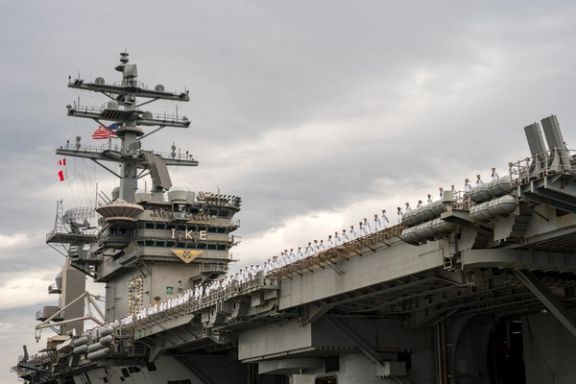
The US military has announced the deployment of another aircraft carrier strike group to the Middle East amidst the ongoing conflict between Israel and Hamas.

The US military has announced the deployment of another aircraft carrier strike group to the Middle East amidst the ongoing conflict between Israel and Hamas.
The US military has announced the deployment of another aircraft carrier strike group to the Middle East amidst the ongoing conflict between Israel and Hamas.
The decision to send the USS Dwight D. Eisenhower and accompanying warships to the Eastern Mediterranean comes in response to the invasion of thousands of Hamas militia into Israel on October 7. It resulted in the loss of at least 1,400 mostly civilian lives and at least 431 hostages taken to Gaza in the single most deadly day in Jewish history since the Holocaust.
The United States aims to support the USS Gerald Ford in the region to prevent further escalation of the conflict as US bases in Iraq and Syria have already come under fire from Iranian proxies in recent weeks.
In addition to the naval deployment, the United States has also dispatched over two thousand Marines to the Middle East. The Biden administration has consistently issued public warnings to Iran and its proxies to avoid escalating the conflict in the region. President Biden has directly conveyed his message to Iran and Hezbollah, emphasizing, "Don't. Don't. Don't. Don't."
According to a statement by US Central Command, the strike group is under the command of Carrier Strike Group 2 and is composed of the flagship aircraft carrier USS Dwight D. Eisenhower, guided-missile cruiser USS Philippine Sea, and guided-missile destroyers USS Mason as well as USS Gravely of Destroyer Squadron 22. Carrier Air Wing 3, with its nine squadrons, and the Information Warfare Commander are also part of the deployment.

Arab leaders publicly pressed US Secretary of State Antony Blinken on Saturday to secure an immediate ceasefire in Gaza, as Iran continued to use threatening rhetoric.
In a rare open display of disagreement, the top US diplomat pushed back as he stood next to his Jordanian and Egyptian counterparts at a news conference, saying a ceasefire would only let Hamas regroup and launch more attacks on Israel. Earlier, the US had spoken of a humanitarian pause.
Blinken met the Saudi, Qatari, Emirati, Egyptian and Jordanian foreign ministers in Amman four weeks after Hamas fighters burst over the border into Israel, killing 1,400 people and taking more than 240 people hostage.
"Right now, we have to make sure that this war stops," Jordanian Foreign Minister Ayman Safadi told the news conference.
Blinken said all were agreed on the need for peace and that the current status quo in Gaza cold not hold, but he acknowledged there were differences between Washington, which has called only for pauses to led aid into Gaza, and its allies.
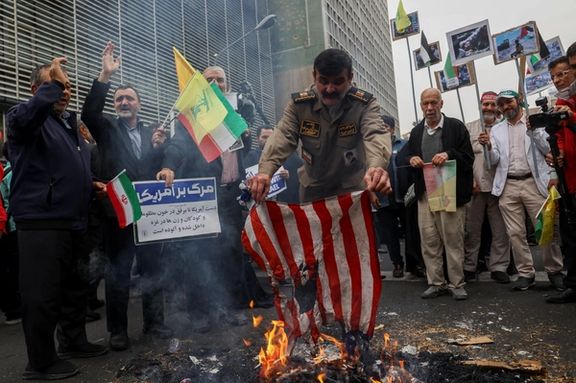
"A ceasefire now would simply leave Hamas in place, able to regroup and repeat what it did on October 7," said Blinken, on his second trip to the region since Israel and Hamas went to war. "No nation, none of us would accept that."
The Iranian regime, which has so far refrained from any direct involvement in the war, staged rallies on Saturday to highlight the takeover of the US embassy in Tehran in November 1979 that resulted in American diplomats being held hostage for 444 days. Anti-American rhetoric was rampant by officials and government media, as the regime has been trying to shift the blame for Israel’s retaliatory attack on Gaza to the United States.
Reports emerged of Hamas leader Ismail Haniyeh having met Iran’s ruler Ali Khamenei in recent days, traveling from Qatar to Tehran. No details were available about the talks.
Israel continued its air and ground operations in Gaza accompanied by a barrage of accusations that civilian targets were hit. However, it is extremely difficult to say what locations or vehicles are being used by Hamas, which often uses civilian buildings for military purposes.
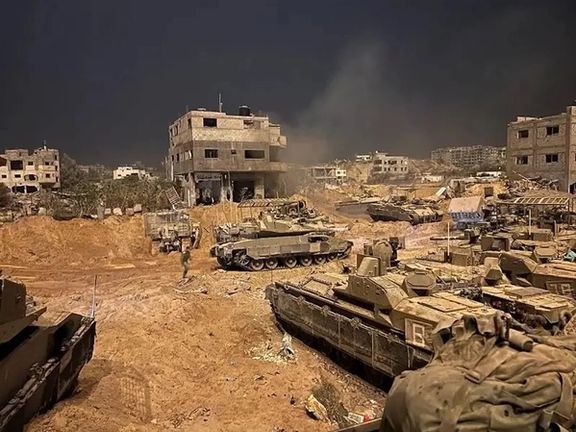
Israel last month ordered all civilians to leave the northern part of the Gaza Strip, including Gaza City where it says Hamas militants are hiding in tunnels, and head to the south of the enclave.
The military said it would enable Palestinians to travel on a main Gaza Strip highway, the Salah a-Din road, during a three-hour window on Saturday afternoon. "If you care about yourself and your loved ones, heed our instruction to head south," it said in a social media post in Arabic.
Several residents told Reuters they were too afraid to use the road due to Israeli forces and many posted warnings on social media that Israeli tanks were stationed on it. At the same time they were social media reports accusing Hamas of firing on the road during the time window for civilians to leave.
US Special Envoy David Satterfield said in Amman that between 800,000 to a million people had moved to the south of the Gaza Strip, while 350,000-400,000 remained in northern Gaza City and its environs.
Israel has imposed a full blockade on Gaza and allowed very little aid in from Egypt, saying it fears it would be stolen by Hamas. Satterfield said there were no recorded instances of Hamas seizing aid.
In what appeared to presage a widening of Israel's ground offensive, the military issued footage showing armored bulldozers churning up northern Gaza areas in what it described as "creating access routes for forces".
A combined tank and combat engineering unit carried out a "pinpoint raid" in the southern Gaza Strip "to map out buildings and neutralize explosives", it said.
Lebanon's Hezbollah said it carried out simultaneous attacks on Israeli positions at the Lebanese border on Saturday, as residents of south Lebanon reported some of the fiercest Israeli strikes yet during weeks of cross-border clashes.
The Israeli army said its warplanes had struck Hezbollah targets in response to an earlier attack from Lebanese territory and was accompanying the air strikes with artillery and tank shelling.
The Hezbollah movement in Lebanon is backed by Iran, as is Hamas. Hezbollah leader Sayyed Hassan Nasrallah on Friday warned that conflict could spread if Israel continued bombing Gaza.
Pro-Palestinian protests took place on Saturday in European capitals including London, Berlin and Paris to call for an immediate ceasefire.
With reporting by Reuters

The leader of the Palestinian group Hamas, Ismail Haniyeh, met Iranian Supreme Leader Ayatollah Ali Khamenei during a visit to Tehran in recent days.
A Hamas official reveled the news about the meeting on Saturday in remarks broadcast by al-Mayadeen television affiliated with the Iranian regime.
Osama Hamdan, a senior official in the Iran-backed Hamas, gave no further details about the visit to Tehran, speaking in Beirut. However Iranian official media was silent about the meeting on Saturday.
Haniyeh has resided between Qatar and Turkey since 2019. Both countries are close supporters of Hamas, with Qatar providing hundreds of millions of dollars annually to the militant Islamist group.
However, Khamenei and his Islamic regime in Tehran have been the main military backers of Hamas, providing weapons and training through their network of militant proxy forces in the region, including the Lebanese Hezbollah. However, the Iranian regime has so far stopped short of direct involvement in the Israel-Hamas conflict.
The United States has deployed two powerful naval strike groups led by large aircraft carriers in the eastern Mediterranean, in addition to reinforcing its presence in the Persian Gulf in the summer.
Haniyeh had already met with Iran’s foreign minister Hossein Amir-Abdollahian in Qatar on October 31.
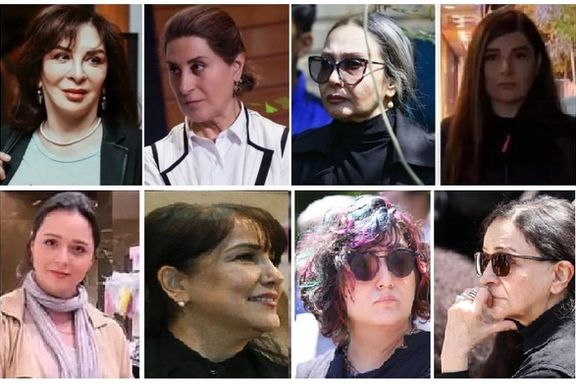
The head of Iran's Cinema Organization has defended the ban on several actresses who removed their hijab in solidarity with the Woman, Life, Freedom protests last year.
The anti-regime protests in 2022 gained momentum following the tragic death of Mahsa Amini while in hijab police custody, leading to a wave of outrage. In a show of solidarity with the protests, a number of Iranian actresses publicly shared images of themselves without the obligatory hijab.
The government official in charge of strictly regulating the cinema industry, Mohammad Khazaei, indirectly mentioned that the condition for lifting the ban on the actresses' work is an "apology for violating the mandatory hijab." He implied in a TV program that the ban's removal is contingent on the actresses "changing their approach."
Khazaei also pointed out that the legal authority for implementing the ban on the female artists lies with either the judiciary or security agencies, suggesting that the decision to prohibit their work had been made outside the realm of the Cinema Organization.
Responding to protests by filmmakers and cinema professionals who opposed the ban, Khazaei claimed that the Cinema Organization follows the orders and directives of the judiciary and security agencies.
Earlier, Mohammad Mehdi Esmaili, the Minister of Culture, once again confirmed the ban on actresses who had refused to wear the mandatory hijab. On October 25, Iran officially released a list of actresses who are now prohibited from working in the film industry due to their non-compliance with the hijab requirement.
The list of affected actresses includes several well-known figures in the Iranian film industry, such as Baran Kosari, Vishka Asayesh, Taraneh Alidousti, Katayoun Riahi, Panteha Bahram, Hengameh Ghaziani, Pegah Ahangarani, and others.
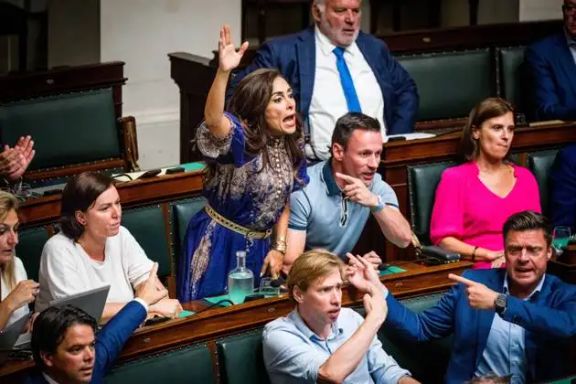
An Iranian-born European lawmaker has condemned attempts to silence her with the label of ‘Islamophobe’, especially since the current conflict began in the Mideast.
Darya Safai, a member of the Belgian parliament, mentioned on her X account that some individuals are attempting to silence her by labeling her as an 'Islamophobe.'
Safai is also a member of the Parliamentary Assembly of the Council of Europe.
“What the world is experiencing today is much broader than a war between Israel and Hamas. It is a broad war that shows the direction for certain Muslims to ultimately achieve their goals," she said, highlighting the Muslims’ promised goal to conquer the world and establish an Islamic rule.
“A goal promised to them in their holy book. In the eyes of Islamists, this is a war between Muslims and Israel/West in order to eventually form and conquer a great ummah as the ultimate goal,” said Safai, who has been one of the most vocal European politicians against the violations of human rights by the Iranian regime.
Expressing what many Iranians feel, Safai said, “Criticizing a religion or an ideology, like criticizing Islam, is not something that can be compared to racism or fascism.”
She touched upon an issue often discussed in Iranian social media and said that people who are in line with the Islamic Republic’s propaganda aim to silence all voices of reason. “These shouters do insinuate this and, in this way, try to silence the critics with their term 'Islamophobia’”, she added.
Safai also pointed out that phobia is an unreasonable fear of something, arguing that fear of what Islamist extremists can do is a genuine fear justifiable by the history of deadly attacks on peaceful activism by Islamists.
“Anyone who has grown up in a country where Sharia law is the law, and has experienced it first-hand, has reasons enough to be afraid of the destruction Islam can create," she said.
The regime in Iran killed about 600 people and arrested 22,000 people in 2022-2023 just to prove that the regime did not kill a 22-year-old girl for hijab defiance. “Despite what some naive people try to make us believe here in the West, Islam is not the religion of love and peace, but an ideology that promises its followers a glorious victory, and everything necessary to follow that path, even jihad and terror, is justified,” Safai said.
Vowing that she would “not be silenced by being intimidated with the label Islamophobe,” she said, “I am not afraid and will resolutely continue my work with everything in my power. As a politician it’s my duty to protect Europe and our society from these extremists and I will continue to do so.”
Her remarks echoed a similar sentiment by a large number of Iranians who have become especially vocal about their opposition to the Islamic Republic’s narrative of the Middle East conflict.
On Thursday, Ali Rabiee, a spokesman for former Iranian president Hassan Rouhani, implicitly confirmed the high number of Iranians who support Israel in the war against Hamas, which declared war on Israel October 7, when its forces killed 1,400 Israelis and took over 230 hostages.
Rabiee described the Iranians’ pro-Israel stance as an act of oppositional defiance against the Islamic Republic, derived from decades of justifying hefty investment in militant Palestinian and other groups. Some Iranians stand with Israel in the conflict based on their “national oppositional defiance” against the Islamic Republic, he said.
Since the Hamas terror operation it codenamed al-Aqsa Flood (Storm in Persian), Iranians have become even more vocal about their distance from the Islamic Republic’s narrative of the conflict, making trendy hashtags like #IranStandsWithIsrael or chanting creative slogans about where the regime should put the Palestinian flag.
An emotional funeral for a young Israeli soldier of Iranian origin killed in the Hamas attack went viral earlier this week. People saw a video of Shirel Haeimpour’s grandfather singing a traditional Jewish love song and a wedding song with his Esfahani Persian accent for the young woman.
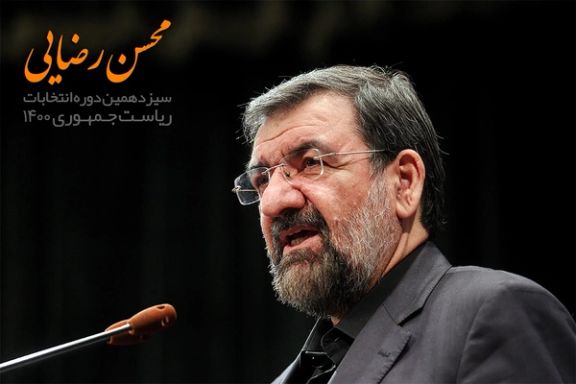
The former commander of the Iranian Revolutionary Guards, Mohesen Rezaei, says pivotal events are on the horizon in Palestine in coming days.
Speaking on Saturday, Rezaei emphasized that Iran cannot remain indifferent to global issues, asserting that the world is increasingly interconnected with Iran's interests. He also claimed that Iran's presence beyond its borders is aimed at “minimizing potential threats within its own territory while ensuring regional stability.”
His comments come as numerous Iranians find it objectionable that their nation's resources are channeled into backing proxy forces across the region, such as in Lebanon, Palestine, Syria, and Yemen. They believe such activities create international friction involving Iran and Iranians, at a time when the urgent needs of the people are being overlooked.
However, Rezaei stated that Iran is not actively seeking war but is “unafraid of it if necessary.” He referred to Hezbollah leader Hassan Nasrallah's speech the previous day.
Nasrallah on Friday commented on the ongoing conflict between Hamas and Israel saying that the decision to launch the October 7 attack on Israel by Hamas was entirely a “Palestinian decision.” There have been claims of Iranian and Hezbollah involvement in planning the attack, with reports of meetings in Beirut and Damascus since April.
Some social media users mocked Nasrallah's statements, suggesting that he refrained from direct involvement in the ongoing conflict, fearing potential US repercussions.
Others pointed out that, similar to Iran's ruler Ali Khamenei, Nasrallah limited his threats to verbal rhetoric and has not actively support Hamas in the war, in line with previous US warnings to both parties.